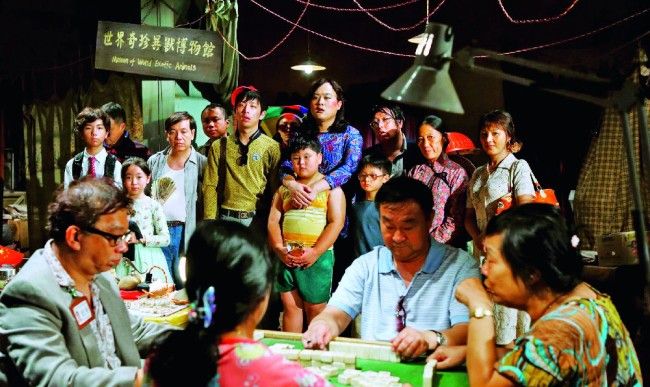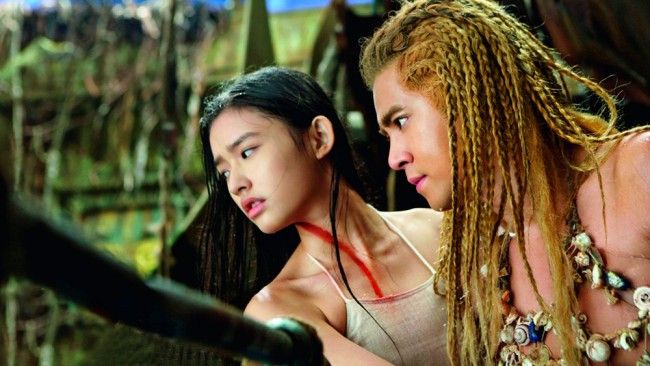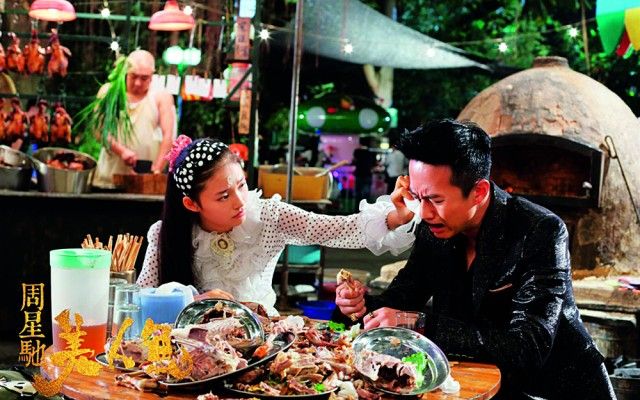A tale of mythology and environmentalism from the man that brought us Kung Fu Hustle
Despite being a comedy, there’s something disturbingly dark about Stephen Chow’s latest film The Mermaid (美人鱼). Take a Katherine Heigl rom-com, add Jurassic Park, the Looney Tunes, Alice in Wonderland, and the most disturbing nightmare you ever had as a child and you might get something along the lines of Chow’s recent project. Having grossed 523 million USD in the Chinese box office alone, The Mermaid is already one of the highest earning pictures of all time in China, beating out worldwide sales of the Hollywood action blockbuster Deadpool.
Chow, whose previous films have included the likes of Kung Fu Hustle, Journey to the West: Conquering Demons, and Shaolin Soccer, is one of the key figures establishing the vernacular of modern Chinese slapstick comedy. The absurdity of Chow’s comedic style employs singing and dancing, Tom-and-Jerry-style chase scenes, and a host of other techniques Chow has developed over the years. The Mermaid is no exception: a young mermaid is sent to assassinate a real estate developer who has polluted the oceans; instead, (spoilers, if it can be called that, ahead) they fall in love.
It’s the most accessible bit of classic Chow tomfoolery mixed with environmental fable since Kung Fu Hustle, and yet, Sony Pictures gave it an incredibly limited release in the US, signaling the final end to the days of domestic US theatrical releases of Chinese films. It’s sad, because The Mermaid genuinely has something to offer to audiences of all nationalities: a hilarious parable of environmentalism that seeks to emphasize the ecological devastation of environmental pollution through farcical humor and a complete fairy-tale love story that’s so absurd that nearly anyone should get the point.
The film begins with a slapstick venture through the “Museum of World Exotic Animals” somewhere along the Guangdong coast, a jab at the eating culture of Guangdong, known for consuming (to near extinction) many of the animals that live there. It’s also a commentary on the current depleted state of the animal kingdom; the pudgy “museum owner” displays a bunch of fake exhibits including a hybrid of a salted mackerel.

Tourists venture to the absurd “Museum of World Exotic Animals”
Liu Xuan (Deng Chao), a self-made millionaire and real-estate developer, is looking to acquire the Green Gulf; a protected cove which is home to a rare dolphins. In order to follow through with his dastardly plan to develop it into ocean front property, he hires a team of sonar-wielding boatmen to chase out all the marine life with their powerful sound guns.
Unbeknownst to him, the cove is also the sanctuary for merpeople, and the new weapons cause many of them to fall sick and die. The last of them now reside in the belly of a sunken ship—Shanshan ( Jelly Lin), one of the last remaining beautiful mermaids who has learned how to waddle on her fins, is tasked with showing up to Liu’s after-party and assassinating him, by the band’s leader, the half-man half-octopus Brother Eight (Show Luo). However, during their date when she and Brother Eight planned on assassinating Liu, Shanshan and the misguided millionaire develop feelings for each other. Meanwhile, Ruolan (Kitty Zhang), the icy daughter of Liu’s tycoon rival (the venerable Tsui Hark) has her own plans for amassing her fortune, whether it takes seducing Liu or brutalizing her way into the Green Gulf.

Shanshan and Brother Eight temporarily reside in a sunken ship
The final showdown almost plays itself out: Liu, having fallen in love with Shanshan, is pitted against Ruolan and her boatmen in a fitting show of both brutality and comedy that has become a staple of Chow’s directorial style. While sometimes Chow’s movies can be rather unpredictable, The Mermaid follows a rather identifiable path after its rambling opening sequence. The fun comes not from knowing full and well that Shanshan and Liu are heading towards inevitable fairy-tale love, but from the silly antics Chow employs left and right to get them there.
The courtship is actually rather compelling: there’s nothing in the way of the romance except their deranged selves—they’re like two hungry adolescents running off like puppy dogs and it’s easy to accept without any extra rationalization from the script (at one point, the would-be lovers are shown throwing up in front of each other). Chow’s penchant for extending his films just over the line of comfort in any given direction is also most apparent in The Mermaid: the final massacre of the merpeople more than just evokes the violence of dolphin slaughter in the cove and there’s more than enough gore and blood to make one squirm.

Shanshan (Jelly Lin) takes Liu Xuan (Deng Chao) to a restaurant she favors
While The Mermaid is a great movie, it’s apparent that this is also not Chow’s piece de resistance: That he is willing to branch out into new forms, push existing boundaries even further and avoid endlessly remaking his successful pieces speaks to Chow’s creativity. While The Mermaid is a strong contender, it is clear that there will be other even greater jewels in his crown, fitting and rather impressive for a mainstream commercial director.
“The Mermaid” is a story from our newest issue, “Romance”. To read the whole piece, become a subscriber and receive the full magazine. Alternatively, you can purchase the digital version from the iTunes Store.












